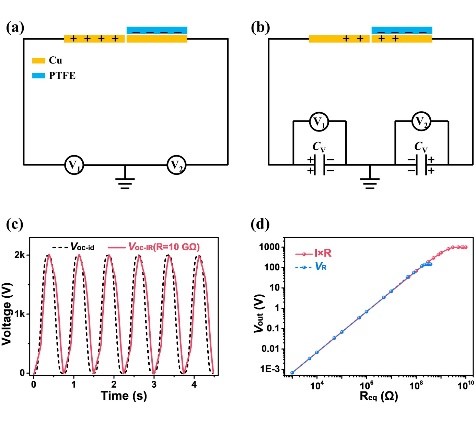Recently, the research result of Prof. Gang Cheng's group "A general charge compensation strategy for calibrating the voltage of a triboelectric nanogenerator measured by a capacitive circuit" was published in the famous international journal Nano Energy (IF=16.602, JCR District 1).
Article link: https://doi.org/10.1016/j.nanoen.2021.106056
The development of the Internet of Things (IoT), artificial intelligence, big data, etc., requires a variety of sensors, which are characterized by large number, distributed, wireless, portable, and etc., making it difficult to provide stable and reliable power sources for them. Developing new technologies that can harvest energy from their working environments is a feasible solution. Triboelectric nanogenerator (TENG) that invented in 2012 can harvest various mechanical energy from the surrounding environment, such as wind, water flowing, mechanical vibration, human motion, etc., and convert them into electricity efficiently. TENG has the advantages of simple structure, low cost, wide material sources, high energy conversion efficiency at low frequency, and etc. In an ideal open-circuit state, any charge transfer on the electrodes is not allowed. If charge transfer occurs during the voltage measurement, the measured voltage value will be lower than the actual voltage value. Therefore, avoiding charge transfer on both electrodes is the key for accurately measuring the voltage of a TENG, including open-circuit voltage (Voc) and output voltage.
It is found that two factors can cause charge transfer of the electrodes during voltage measurement. The first factor is the ground terminal of the measurement instrument (whether voltmeter or ammeter). Except the single-electrode mode TENG, one electrode of a TENG is directly connected to the ground terminal, resulting in charge transfer between the electrode and the ground, and thus the measured voltage value is lower than the actual voltage value. To solve this problem, in our previous work, the non-grounded voltage measurement methods were proposed, which avoided the charge transfer caused by the ground terminal of the electrometer. The second factor is the inner capacitance of voltmeter Cv. The existence of Cv causes charge transfer between TENG electrodes and Cv, resulting in the measured voltage value lower than the actual voltage value. In previous studies, researchers used a small capacitor in series with the voltmeter to estimate the Voc of TENG through the principle of voltage division. However, this method cannot obtain the actual Voc value of a TENG. Hence, it is necessary to develop a universal strategy to accurately calibrate the voltage value measured by voltmeters.

Figure A general charge compensation strategy for calibrating the voltage of a triboelectric nanogenerator measured by a capacitive circuit
In this work, a general charge compensation strategy is proposed for calibrating the measured voltage of a TENG based on the analysis of the capacitive measurement circuit. Two methods have been developed to calibrate the Voc of TENG, namely the fixed capacitance derivation (FCD) method and the variable capacitance fitting (VCF) method, and the calibration formulas of Voc are given, respectively. The measurement results of the four basic working modes TENGs show that the calibrated voltage values are consistent with that of the non-capacitive measurement circuit (ammeter series resistors), demonstrating the validity and universality of the charge compensation strategy. Finally, the relationship between the output voltage of a TENG and the load resistance is calibrated through the equivalent impedance including the inner capacitance of the voltmeter. The proposed charge compensation strategy for calibrating the voltage of a TENG measured by capacitive circuit is of great theoretical and application significance for the establishment of a comprehensive evaluation system of TENG’s output performance.
Master student Wenhe Zhang and Dr. Guangqin Gu are the co-first authors of the paper, and Prof. Gang Cheng and Prof. Zuliang Du are the co-corresponding authors of this paper. This work was supported by funding from the National Natural Science Foundation of China, the Science and Technology Department of Henan Province, China Postdoctoral Science Foundation, and Henan University.